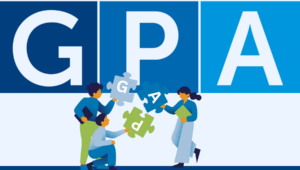
Boost Your Organization’s Leadership GPA
Learn about the three essential priorities for modern leaders with NLI’s new Leadership GPA quiz and webinar series.
Thank you for searching the NeuroLeadership Institute archives. Here’s what we were able to find for you.
Still having difficulty finding what you’re looking for? Contact us.

Learn about the three essential priorities for modern leaders with NLI’s new Leadership GPA quiz and webinar series.

By prioritizing these capabilities, energy and utilities leaders can ensure their organizations remain resilient in the face of relentless change.

Growth mindset, psychological safety, and accountability must work together for effective leadership.

In growth-mindset cultures, getting better matters more than looking good.

AI can help drive organizational change — but only if we understand human behavior.
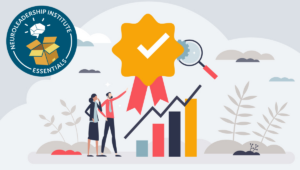
In today’s changing world of work, it’s more important than ever to know how to give and receive feedback.
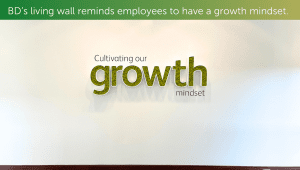
A 125-year-old medical technology company adapted quickly to help diagnose, vaccinate, and treat COVID-19.
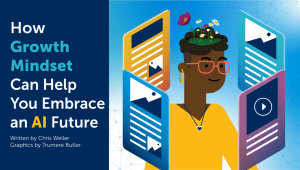
You can let the fear of AI stymie your career growth, or you can seek out opportunities to use it to your advantage.

How you can leverage AI to improve skills and drive innovation.

Will AI ever possess social skills, and what does that mean for the future of work?

Employees are often reluctant to give their managers honest feedback. Here’s why, and what to do about it.

Contrary to popular belief, AI might soon become a better leader than humans. We need to plan for that future now.

Adapt to a new normal or embrace persistent agility? Here’s why a learning agile culture may be the way to equip organizations for continuous innovation and growth.

By following a few key practices, it’s possible — and deeply beneficial — to create teams of high performers.

Growth mindset shows up in nearly all aspects of life and work. But what exactly is a growth mindset, and how can we use it to get better?

Building rapport with young employees in a remote or hybrid environment may seem like a tall order, but it doesn’t have to be.

Turn mistakes into opportunities by forgiving yourself first.

In a society obsessed with transparency, leaders are encouraged to reveal their innermost thoughts and feelings. But is there such a thing as too much sharing?

Can personality tests help you choose the best job applicant?

Ted Lasso exemplifies a new, more empathetic, more collaborative kind of leader. Here’s what we can learn from him.

Honing only one skill set can lead to a fixed mindset and the inability to think creatively about a new problem.

Growth mindset allows for a continuum of personal growth and development that allows an individual autonomy over their own personal growth.

By embracing a growth mindset, teams can absorb and act on feedback rather than dreading it and avoiding opportunities out of fear of failure.

One way leaders can foster a growth mindset is by rewarding improvement over time.

Don’t miss out on the many upsides of candidates with “portfolio careers.”

How taking a break from something and returning with a fresh perspective can lead to game-changing new insights.

Here’s why we should push ourselves out of our comfort zone at work.

New research shows feeling uncomfortable could be key to our success.
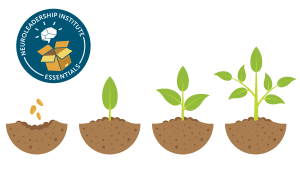
For the past decade, the NeuroLeadership Institute has been the global leader in organizational growth mindset. Here are some of our content highlights.

Offering employees a choice in how they want to work may have more upsides than requiring a return to office.

Play isn’t just a way to relax and unwind during leisure time. Studies show that play is also a powerful way to increase employee creativity, innovation, and engagement.

Although most people would never admit to following the crowd, social norms are a surprisingly powerful impetus for behavior change.

Any type of job transition is hard, but particularly one in which your identity is so tied up in what you do. That’s what Eric Hipple, a former NFL quarterback for the Detroit Lions, found as he navigated life after pro football.

Science-backed ways to help you make sense of the world in times of crisis.

It can be helpful to reassess situations to regulate our emotions. But when we’re quite stressed, that reassessment could turn malevolent.

Transitions are tough. In this Q&A, we speak with a recent college graduate about what she’s learned about transitions, and why her viral video on the topic struck a nerve.

Recent research shows napping, when done right, can increase alertness, and enhance our cognitive performance, memory and training. Here’s how to get the most out of a midday snooze.

What brain science says about how to set yourself up for success when you’re starting a new job.
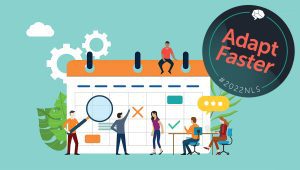
Leaders can spend a slew of time and money on organizational change initiatives. But many of them often fail. Here’s why and how to get them right.

There are many benefits to giving workers more autonomy. But you must plan carefully, or things can backfire.

It’s not your imagination that rudeness is rising in the workplace. Here’s how to tackle incivility and get to a more polite and productive state.

There are four components that create optimal conditions for learning complex tasks in high stakes occupations: a growth mindset, a safe environment, the will, and the way.

A sense of control, or the power to decide, is a key human need. Here are several ways leaders can increase workers’ sense of autonomy and maximize employee engagement and performance.

Diversity training can feel performative, and elicit groans from those asked to attend. But it absolutely can be impactful, and that’s through a mix of both delivery and measurement.

What does your brain look like on goals? What’s happening? How could the process be better?

If you’re trying to differentiate some of our learning and habit activation products based on your current needs, here’s (almost) all of our product explainer videos in one place.

A landing place for some of the big themes around work as of late 2021.

NLI has worked for years to develop “sticky” acronyms to help people understand the brain science behind performance, learning, motivation, feedback, and dealing with bias. Here’s a brief summation of that work.

A primer on the importance of insights and how to generate more of them.

Our newest product, FLEX, is designed to help executive leaders and front-line managers thrive in a hybrid world, and create a world of fairness and autonomy for their teams. Here’s some of the origin story.

We talk often about the logistics of returning employees to offices, which is no doubt important. But what do managers need to do in order to manage the EMOTIONS of the moment?

COVID most assuredly is not “over,” and the fall might be an even worse time for some communities. Time will tell on COVID’s various impacts on work, but here’s some of what we know now.

People have lots of theories about what the “new world of work” will look like. Maybe in reality it’s just about managers learning how to structure better, insight-laden conversations.

To affect change, changing language around privilege can strengthen the voice that’s speaking and improve the outcome with the listener.

For governments everywhere, agility is essential. But unfortunately it’s not the norm. Growth mindset can help.

As we progress through our careers, we may feel that we’re not qualified for our role-a tendency known as imposter syndrome. Fortunately, there’s a cure.

Let’s Start a Conversation Read the Full Case Study KEY INDUSTRY Financial Services PRACTICE AREA Culture & Leadership PRODUCT Trusted as the CULTURE CHANGE Partner To Some of the World’s Most Impactful Organizations Case Studies by Practice Area Across industries, we make organizations more human and higher performing through science. These case studies show the change we can co-create. Diversity, Equity & InclusionTake inspiration from firms that mitigate bias and create equitable cultures.Accelerate Inclusion Culture & LeadershipExplore how organizations transform their culture, and shift mindsets at scale.Transform Leadership Talent & PerformanceLearn how companies harness feedback to improve employee retention, engagement and development.Optimize Performance Want to Find the best solution for you today? Commit to Change Connect with NeuroLeadership experts to explore how you can transform your organization at impact, speed, and scale. Scroll To Top
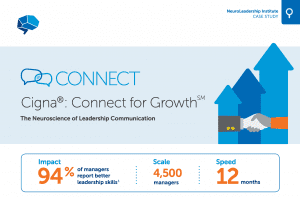
Let’s Start a Conversation Read the Full Case Study KEY INDUSTRY Healthcare PRACTICE AREA Performance PRODUCT Trusted as the Bias Mitigation Partner To Some of the World’s Most Impactful Organizations Case Studies by Practice Area Across industries, we make organizations more human and higher performing through science. These case studies show the change we can co-create. Diversity, Equity & InclusionTake inspiration from firms that mitigate bias and create equitable cultures.Accelerate Inclusion Culture & LeadershipExplore how organizations transform their culture, and shift mindsets at scale.Transform Leadership Talent & PerformanceLearn how companies harness feedback to improve employee retention, engagement and development.Optimize Performance Want to Find the best solution for you today? Commit to Change Connect with NeuroLeadership experts to explore how you can transform your organization at impact, speed, and scale. Scroll To Top

What better way to ring in 2021 than with a new perspective on your own potential? Growth mindset can help unlock skills you once thought were unattainable.

Giving and receiving better feedback requires us to kick some old habits and adopt a new mindset. Here’s how science can help.

It’s hard to be cognitively effective during a crisis. Research shows that a few key shifts in mindset can help us stay focused and productive.

There’s a cost to regarding yourself through a fixed mindset. Adopting a growth mindset can help you meet today’s challenges.

With the world on lockdown, organizations everywhere have had to rethink how they operate. But in the midst of the crisis, some have discovered something unexpected: productivity has gone up, not down. A crisis like a global pandemic naturally triggers extreme anxiety and stress, but it also unleashes tremendous energy and motivation. If leaders keep threat levels low, they can harness that sense of urgency to achieve work results that would normally seem impossible.

Growth mindset isn’t just a “nice-to-have.” It’s a business imperative for helping employees thrive through change and disruption.

NLI’s research has identified three key business reasons for organizations to start seriously trying to adopt a growth mindset.

In moments of disruption, there’s an opportunity to shift our mindset to find deeper meaning in our work. Brain science can show us how.

Mindset dictates the way we think about goals and determines how we interpret successes and failures. A growth mindset can help us thrive through crisis.

The culmination of the NFL season gives us a good opportunity to think about what great coaches can teach us about great leadership.

Change will always feel slightly uncomfortable. The trick is using your mindset to interpret the change as an opportunity to grow.

A major concept discussed at this year’s NeuroLeadership Summit was growth mindset, a critical tool for boosting teams’ performance.

Cigna, a global leader in healthcare services, has embraced growth mindset to transform both its agility and its approach to performance management.

Microsoft’s growth mindset has helped the organization develop into one of the most valuable companies in the world. Here’s how they did it.

As detailed in our new white paper, “Growth Mindset: Case Study Collection,” the Telenor case study illustrates how companies of any age and size can adapt.

Growth mindset comes alive in a number of organizations, and a new NLI white paper showcases four of those success stories.

Leaders who cultivate an organizational growth mindset can focus their attention in a number of areas, all of them beneficial for overall team health.

Getting feedback doesn’t have to feel like an attack on your performance. With a growth mindset, feedback can become the useful tool it’s meant to be.

By using growth mindset, we can give performance reviews that are more accurate, less threatening, and support our team members to develop and succeed.

Research has shown that leaders can improve multiple aspects of performance management by helping their teams to build a growth mindset.

With a continued focus on growth and key leadership principles, HP has managed to dominate its market and see huge gains in engagement.

Research shows some leaders take growth mindset and run in all sorts of directions with it. To understand why, we can look to the science of learning.

Growth mindset, the research indicates, can help leaders adapt to the automation of labor and other forms of the AI revolution.

Leaders naturally want their employees to bounce back from failures and strive toward improvement — the hallmarks of a growth mindset. But how to cultivate that reality is seldom easy or obvious. Our research at the NeuroLeadership Institute finds better feedback conversations mark the smartest place to start. We define growth mindset as the dual belief that employees’ skills can be improved and that improving those skills is the point of the work people do. The trouble many companies run into, however, is getting people to seek out improvement. Growth mindset is uncomfortable. It requires people to confront their weaknesses, which may feel like personal shortcomings. Regular feedback conversations, in which people ask for feedback rather than give it unsolicited, may help people see challenges as opportunities, not threats. Real lessons from fake negotiations NLI recently published a study that included 62 people from a major consultancy, who were asked to engage in a mock negotiation. Each negotiation was one on one. Researchers behind the study hooked subjects up to heart rate monitors. During the negotiation and in feedback conversations afterward, the heart rate monitors tracked people’s physiological responses. Findings indicated that feedback-givers were just as stressed out as askers. However, those givers who were asked for feedback showed less heart-rate reactivity than givers made to give feedback unprompted. We draw a lot of conclusions from the study. In terms of growth mindset, the biggest one is that asker-led feedback conversations are a lower-stress way for teams to discuss performance. If leaders can encourage team members to ask for explicit feedback on a regular basis, we contend that employees will gradually begin to view critiques as less threatening. They’ll focus less on failures and more on growth. They’ll welcome challenges, not shy away from them. Start small to go broad Leaders play a crucial role in modeling this behavior. According to NYU psychologist Tessa West, an NLI senior scientist and the study’s lead author, it’s still threatening to start asking for feedback. So leaders can use small-stakes questions to get people thinking in terms of improvement, rather than pure wins or losses. For instance, a manager can ask her team what they thought of her eye contact during the last meeting. Performed over and over again, across departments, asking for feedback could hold the power to send a growth mindset rippling across an entire organization. And it all begins with the decision to ask the right questions. [action hash=”6cd538cd-54dd-4b69-a152-d85ebcd24518″]

In a recent pop up survey on NeuroLeadership.com, we asked visitors one question: What does it mean for a person to have a “growth mindset”? From the 208 responses we received, we learned that, given a few options featuring the most common meanings attached to growth mindset, the vast majority of participants identified the right one: 89% of survey participants correctly identify growth mindset as the belief that a person’s abilities can be improved (correct) 9% think that having a growth mindset means to be positive and optimistic (incorrect) Only 1.4% think that it relates to striving for business growth (incorrect), and 0.5% don’t know what it means (unfortunate) These results basically reflect the findings from our recent industry research on growth mindset. As HR and talent teams work hard on clarifying and communicating the correct definition throughout the organization, they mostly succeed. Once in a while, though, they may encounter individuals or teams that hang on to misinformed and false ideas of growth mindset. We recently explored this trend in an article called “5 Mistakes Companies Make About Growth Mindsets” for the Harvard Business Review. Simply put, don’t mistake growth mindset for endless optimism. We at the NeuroLeadership Institute define growth mindset as the belief that skills and abilities can be improved, and that developing our skills and abilities is the purpose of the work we do. But we have also learned something else in our research: people in organizations attach various, personalized interpretations to the idea of growth mindset — something we highlighted in our recent webinar Growth Mindset 101. Getting the idea of growth mindset right matters. This powerful concept will be increasingly important for individuals and organizations who need to adapt to the ongoing changes posed by digital disruption. Given the many interpretations of growth mindset that are out there, clarifying what it means — and what it doesn’t mean — is a crucial step in creating a growth mindset culture. What really makes a difference is when organizations are able to weave the concept of growth mindset deep into their people’s everyday behaviors and their organizational processes. In order to do that, organizations first need to be clear on what growth mindset means to them. Send your thoughts, feedback, and criticism to Andrea Derler, NLI’s director of industry research. [action hash=”6cd538cd-54dd-4b69-a152-d85ebcd24518″]

Growth mindset has gained a lot of popularity in organizations over the past decade, now standing as many leaders’ favorite buzzword for boosting productivity. But there’s still one myth that widely persists among companies — at the risk of employee and organizational well-being. Contrary to what many leaders believe, growth mindset does not refer to a person’s limitless capacity to get things done. For the past three months, NLI has interviewed HR practitioners at more than 20 major organizations around the world, as part of an industry research project. Our goal was to find out what, exactly, leaders were doing when they implemented growth mindset around their organization. We found a range of interpretations. Some thought growth mindset was purely a focus on business growth. Others saw it as the belief that any achievement was possible, no matter how unrealistic the goal. In fact, our working definition of growth mindset is: the dual belief that skills and abilities can be improved, and that developing your skills and abilities is the purpose of the work you do. On occasion, managers who hadn’t quite grasped this concept thought employees with a growth mindset were happy to take on projects endlessly. If they claimed their plate was full, they were seen as having a fixed mindset — a scarlet “F” around many offices. The trouble with this line of thinking is that everyone, at some point, faces issues of “capacity,” or the brain’s limit for cognitive function. There is only so much thought people can devote to their various tasks before their output begins to plateau, or even decrease. Managers who keep overloading their employees with work actually inhibit, not propel, long-term progress. What’s more, by making a judgment on people’s ability to handle more and more tasks, managers risk damaging employees’ sense of status. What initially may have been a point of pride could turn into shame over poor productivity. For the sake of employee and organizational health, leaders should align on the true definition of growth mindset. Saying your plate is full isn’t a sign that your thinking is flawed. In fact, it may be the opposite — a sign that in order to develop your skills, the most important thing you can do is pause, and focus on the job at hand. [action hash=”6cd538cd-54dd-4b69-a152-d85ebcd24518″]
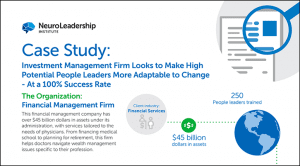
Let’s Start a Conversation Read the Full Case Study KEY INDUSTRY Financial Services PRACTICE AREA Culture & Leadership PRODUCT Trusted as the Bias Mitigation Partner To Some of the World’s Most Impactful Organizations Case Studies by Practice Area Across industries, we make organizations more human and higher performing through science. These case studies show the change we can co-create. Diversity, Equity & InclusionTake inspiration from firms that mitigate bias and create equitable cultures.Accelerate Inclusion Culture & LeadershipExplore how organizations transform their culture, and shift mindsets at scale.Transform Leadership Talent & PerformanceLearn how companies harness feedback to improve employee retention, engagement and development.Optimize Performance Want to Find the best solution for you today? Commit to Change Connect with NeuroLeadership experts to explore how you can transform your organization at impact, speed, and scale. Scroll To Top
Join millions of employees in creating culture change at scale by reaching out today.

In 2007, David and Lisa Rock and their team had been working in leadership development and executive coaching for ten years, when David coined the term “NeuroLeadership.”ef

North America
Africa
South America
Asia
Europe
Australia
© NeuroLeadership Institute 2025. All Rights Reserved
This site uses cookies to provide you with a personalized browsing experience. By using this site you agree to our use of cookies as explained in our Privacy Policy. Please read our Privacy Policy for more information.